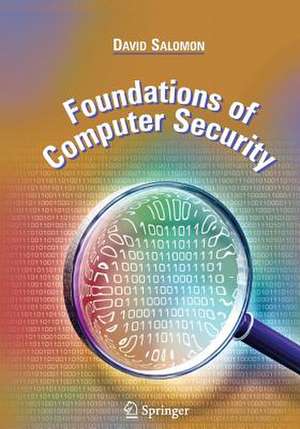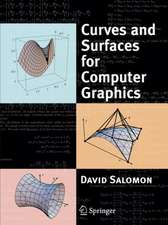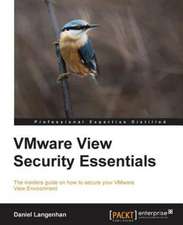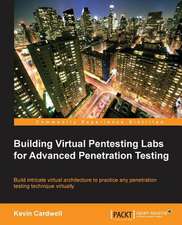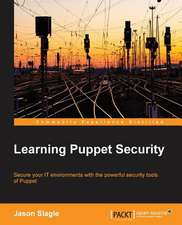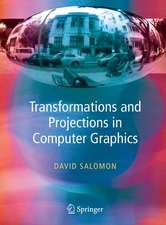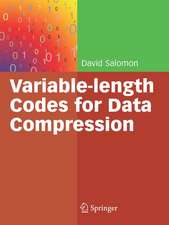Foundations of Computer Security
Autor David Salomonen Limba Engleză Paperback – 13 oct 2010
Written in a clear, easy to understand style, aimed towards advanced undergraduates and non-experts who want to know about the security problems confronting them everyday. The technical level of the book is low and requires no mathematics, and only a basic concept of computers and computations. Foundations of Computer Security will be an invaluable tool for students and professionals alike.
| Toate formatele și edițiile | Preț | Express |
|---|---|---|
| Paperback (1) | 341.81 lei 43-57 zile | |
| SPRINGER LONDON – 13 oct 2010 | 341.81 lei 43-57 zile | |
| Hardback (1) | 404.67 lei 43-57 zile | |
| SPRINGER LONDON – 23 dec 2005 | 404.67 lei 43-57 zile |
Preț: 341.81 lei
Preț vechi: 427.26 lei
-20% Nou
Puncte Express: 513
Preț estimativ în valută:
65.41€ • 68.04$ • 54.00£
65.41€ • 68.04$ • 54.00£
Carte tipărită la comandă
Livrare economică 14-28 aprilie
Preluare comenzi: 021 569.72.76
Specificații
ISBN-13: 9781849965606
ISBN-10: 1849965609
Pagini: 392
Ilustrații: XXI, 369 p.
Dimensiuni: 178 x 235 x 20 mm
Greutate: 0.68 kg
Ediția:Softcover reprint of hardcover 1st ed. 2006
Editura: SPRINGER LONDON
Colecția Springer
Locul publicării:London, United Kingdom
ISBN-10: 1849965609
Pagini: 392
Ilustrații: XXI, 369 p.
Dimensiuni: 178 x 235 x 20 mm
Greutate: 0.68 kg
Ediția:Softcover reprint of hardcover 1st ed. 2006
Editura: SPRINGER LONDON
Colecția Springer
Locul publicării:London, United Kingdom
Public țintă
GraduateCuprins
Physical Security.- Viruses.- Worms.- Trojan Horses.- Examples of Malware.- Prevention and Defenses.- Network Security.- Authentication.- Spyware.- Identity Theft.- Privacy and Trust.- Elements Of Cryptography.
Recenzii
From the reviews:
"...a very nice and well-written introduction to the essential concepts of computer security. ... The book is loaded with examples and exercises that are useful in learning the material. ... This is a book I would not hesitate to give to someone who had very little computer experience and wanted to learn the core concepts of security. The material covered is very broad in scope; however the essentials were well treated and easy to comprehend." (Richard Jankowski, The Book Review Column by William Gasarch, 2008)
"the book is an easy-to-read collection of practical knowledge. …a useful collection of in-depth knowledge… Exercises throughout the chapters make this book entertaining to read, and keep readers actively involved. …worth its price for lecturers and professionals who need in-depth stories to enrich their lectures and presentations." (Edgar R. Weippl, ACM Computing Reviews, Vol. 48 (5), May 2007)
"The intended audience of this book is newcomers … . a very nice and well-written introduction to the essential concepts of computer security. The content was written in an easy tone that would make it approachable to a security neophyte. The book is loaded with examples and exercises that are useful in learning the material. … much of the content is written in bulleted lists. In my opinion, this allows the reader to quickly get an understanding of the core concepts of the material." (Richard Jankowski, ACM SIGACT News, Vol. 39 (2), 2008)
"...a very nice and well-written introduction to the essential concepts of computer security. ... The book is loaded with examples and exercises that are useful in learning the material. ... This is a book I would not hesitate to give to someone who had very little computer experience and wanted to learn the core concepts of security. The material covered is very broad in scope; however the essentials were well treated and easy to comprehend." (Richard Jankowski, The Book Review Column by William Gasarch, 2008)
"the book is an easy-to-read collection of practical knowledge. …a useful collection of in-depth knowledge… Exercises throughout the chapters make this book entertaining to read, and keep readers actively involved. …worth its price for lecturers and professionals who need in-depth stories to enrich their lectures and presentations." (Edgar R. Weippl, ACM Computing Reviews, Vol. 48 (5), May 2007)
"The intended audience of this book is newcomers … . a very nice and well-written introduction to the essential concepts of computer security. The content was written in an easy tone that would make it approachable to a security neophyte. The book is loaded with examples and exercises that are useful in learning the material. … much of the content is written in bulleted lists. In my opinion, this allows the reader to quickly get an understanding of the core concepts of the material." (Richard Jankowski, ACM SIGACT News, Vol. 39 (2), 2008)
Textul de pe ultima copertă
All aspects of computer security—from the firewall for a home PC to the most daunting designs for large distributed systems—are becoming increasingly important worldwide. However, the complexities of securing computing systems can often make the topic too intimidating or onerous for people who are relative novices.
Foundations of Computer Security provides a succinct, yet authoritative introduction to the underlying theory, history, vocabulary, and concepts that drive this pivotal area of computer science. With its user-friendly approach and clarity of style, the text conveys—in simple terms—the core principles and developments underlying computer security in its many ramifications in the rapidly evolving computing arena. Following its opening framework laid out in a broad preface and introductory chapter, the book features chapters dedicated to a wide array of security-related subtopics: physical security, viruses and worms, malware and spyware, privacy and trust, and cryptography, to name several. The work is a sort of guidebook for newcomers: It assumes only basic knowledge of computers and refrains from heavy mathematical elements.
Topics and Features:
• Provides a comprehensive, accessible overview of the elements of computer security, conveyed in an easy-to-understand style
• Covers the main security challenges, and introduces cryptography
• Reinforces its themes with thorough use of examples, exercises (with answers), historical anecdotes, and case studies
• Features a supplemental website for auxiliary instructional material
• Supplies numerous resources, including a helpful glossary, a virus timeline, and an extensive bibliography
• Instructs readers through a logical andprogressive method, yet flavors treatment of the topic with enjoyable quotes, provocative questions, and other educational tools
• Presents the "essentials," but offers additional useful background information
This broad, yet practical textbook/reference is an invaluable instructional tool for undergraduates, graduates, or professionals who know at least the basics about computers but need some exposure to the key elements pertaining to computer security. Its concise approach, complemented by its breadth of security issues covered, will make it an ideal resource for those hoping to learn the foundation topics of this critical subject.
David Salomon is a professor emeritus of computer science at California State University, Northridge. He has authored numerous articles, as well as the popular books, Data Compression: The Complete Reference (now in its third edition) and Data Privacy and Security.
Foundations of Computer Security provides a succinct, yet authoritative introduction to the underlying theory, history, vocabulary, and concepts that drive this pivotal area of computer science. With its user-friendly approach and clarity of style, the text conveys—in simple terms—the core principles and developments underlying computer security in its many ramifications in the rapidly evolving computing arena. Following its opening framework laid out in a broad preface and introductory chapter, the book features chapters dedicated to a wide array of security-related subtopics: physical security, viruses and worms, malware and spyware, privacy and trust, and cryptography, to name several. The work is a sort of guidebook for newcomers: It assumes only basic knowledge of computers and refrains from heavy mathematical elements.
Topics and Features:
• Provides a comprehensive, accessible overview of the elements of computer security, conveyed in an easy-to-understand style
• Covers the main security challenges, and introduces cryptography
• Reinforces its themes with thorough use of examples, exercises (with answers), historical anecdotes, and case studies
• Features a supplemental website for auxiliary instructional material
• Supplies numerous resources, including a helpful glossary, a virus timeline, and an extensive bibliography
• Instructs readers through a logical andprogressive method, yet flavors treatment of the topic with enjoyable quotes, provocative questions, and other educational tools
• Presents the "essentials," but offers additional useful background information
This broad, yet practical textbook/reference is an invaluable instructional tool for undergraduates, graduates, or professionals who know at least the basics about computers but need some exposure to the key elements pertaining to computer security. Its concise approach, complemented by its breadth of security issues covered, will make it an ideal resource for those hoping to learn the foundation topics of this critical subject.
David Salomon is a professor emeritus of computer science at California State University, Northridge. He has authored numerous articles, as well as the popular books, Data Compression: The Complete Reference (now in its third edition) and Data Privacy and Security.
Caracteristici
Comprehensive coverage offering a foundation for all the major areas of Computer Security Written in a clear and easy to understand style Exercises throughout, with answers provided Includes supplementary material: sn.pub/extras
